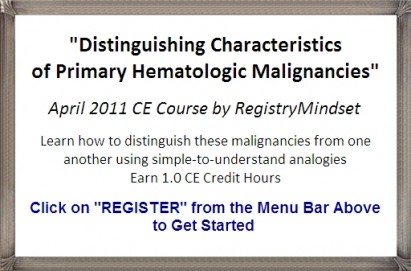Cancer Registrars must develop a new mindset and approach to solving problems in order to provide their organization’s cancer data needs today and in the future. Watch this great inspirational movie and let author, Michael McMillan show you how to re-train your approach to problem solving. Click here to watch this awesome video!
|
|
||
“He who stops being better stops being good.”~ Oliver Cromwell You are invited to watch a short video on seeing into your future as a cancer registrar, click here. How do you see yourself as a cancer registrar and what is in your future? Are you accomplishing great things or are you marking time until something better comes along? Psychologists tell us that most people do not feel or sense their purpose in life and some even doubt they have a purpose at all. Woodrow Wilson, the 28th President of the United States, said: “You are not here merely to make a living. You are here in order to enable the world to live more amply, with greater vision, with a finer spirit of hope and achievement. You are here to enrich the world, and you impoverish yourself if you forget the errand.”
If you have been struggling with all the changes in science and medicine and how this relates to what you do as a cancer registrar, then it is time to stop looking at the problems and start seeing yourself as having an opportunity to defeat cancer. If you have been battling with a negative attitude and resisting change, then it is time to stop dwelling in the negative and to start seeing yourself as blessed with having work and a unique skill set that allows you to serve the needs of others. If you are having difficulty relating to others or communicating the needs of your cancer registry then now is the time to start seeing your purpose and value and how it can help you to communicate and collaborate to strengthen the needs of your organization and cancer registry profession. If you live this way you will succeed. You will find success and achievement in everything that you do. You will be listening to your inner being and fulfilling your destiny on this earth. You will find meaning and purpose in all that you do and you will feed your emotional and professional needs and achieve greatness, happiness and success as a cancer registrar. ——————————– Michele Webb creator of the cancer registrar continuing education program, http://www.RegistryMindset.com, is a nationally recognized, certified cancer registrar, committed to Cancer Registry leadership and professional education as a coach, mentor, motivational speaker and author. You have permission to repost this article as long as you do not alter it in any way, give credit to the author and link back to website and URL. You can watch a short video on this subject by click here. Each of us has the ability and opportunity every day to influence others. How we choose to use that influence will determine whether it is in the best interest of the person, team or organization. If you are like me, you probably want to help others be their best and to achieve their greatest possible levels of success. This is what leadership is all about, influence for the good of the team and organization. A leader’s influence is not determined by their job title, position within an organization, whether they are a certified cancer registrar or not. To influence someone you simply need to have a vision of a better place or way to do something and care about bringing others along with you “for the ride.” In fact, some of the best leaders today are those who do not have line authority or positional command but rather have drive, passion and motivation to help another individual. Through meaningful connections with people and by having a desire to serve their needs and to see them achieve success instead of your own you will effectively lead others to greater levels of success. Focus your goals and motivation around benefits for the team and organization and you will see team, and personal, success leap well beyond what you dreamed possible! To do this, here are simple steps you can take today:
In summary, creating greatness with your team involves meaningful connections with others, focusing on the goals and benefit of the team, planning how you can help the team to achieve the goals and then carrying out that plan by influencing others to walk the path to success with you. This is what being a cancer registry leader is about! ——————————– Michele Webb creator of the cancer registrar continuing education program, http://www.RegistryMindset.com, is a nationally recognized, certified cancer registrar, committed to Cancer Registry leadership and professional education as a coach, mentor, motivational speaker and author. You have permission to repost this article as long as do not alter it in any way and give a link back and credit to the author and this URL. Cancer Registrars have heard, at some point in their career, someone say, “It’s who you know that counts.” It is also said in business that it is not what you know, but who you know that determines your success. Jim Cathcart, a widely known sales coach, asks this question: “Who is glad they know you?” (To watch a short video on this same topic, click here.) This is exactly why people do business with others that they know and trust, cancer registrars included. When you offer value to another person they will have a reason to care and stay connected with you. Cathcart has given five tips for building better business relationships that cancer registrars should implement right away:
The cancer registrar’s business associates include: physicians, administrators, allied health and other cancer program staff. Anyone, regardless of their title or role in the organization, who comes into contact with the cancer registrar during the course of the day is a customer and should be treated as such. By daily practicing these five tips the cancer registrar will not only transform the success of the cancer registry, but she/he will transform their own success and happiness. These same tips can be used to develop the cancer registrar’s personal and departmental mission and value statements to focus the registry’s activities in the right direction. Ultimately, cancer registrars want to leave each person they come into contact with feeling as though they are glad that they know the registrar and pleased with the value and service that the cancer registrar provides. Cancer Registrar training is an essential component of Michele Webb’s website, http://www.RegistryMindset.com. Michele is a 25+ year veteran certified Cancer Registrar who is committed to Cancer Registry leadership and professional education as a coach, mentor, motivational speaker and author. You have permission to repost this article as long as do not alter it in any way and give a link back and credit to the author on this website. Comment on this post by clicking on the balloon below! RegistryMindset released the April 2011 continuing education course this last week titled “Distinguishing Characteristics of Primary Hematologic Malignancies.” This course, eligible for 1.0 CE credit hours from NCRA, guides the cancer registrar through identifying and understanding the differences between leukemia, lymphoma, multiple myeloma and myelodysplastic syndromes. Using simple and easy-to-understand analogies cancer registrars who take this course will be able to “step up their game” in case-finding and abstracting of these primary site cases. To become a member, click on “Register” in the menu bar above and get started today! What role do cancer registrars play in medical informatics? The cancer registrar plays a critical role in collecting, classifying and coding medical information needed to study and develop treatments that will improve patient care outcomes in our short- and long-term future. Data is quickly aggregated as the registrar enters the information into a highly specialized, automated information management system which is, arguably, the most sophisticated and well-defined database within a hospital or geographic area that can be used for cancer medical informatics. Recently, the National Cancer Registrar’s Association (NCRA) publication, “Medical Informatic Basics for the Cancer Registry,” defines this as: “Medical informatics is the intersection of science, computer science and health care. It deals with the resources, devices and methods required to optimize the acquisition, storage, retrieval and use of information in health and biomedicine. Health informatic tools include not only computers but also clinical guidelines, formal medical terminologies and information and communication systems.” With the economic downturn and ongoing budget crunches, cancer registrars might be concerned about their future. However, nothing could be further from the truth! Their future is secure and their involvement in medical informatics, quality control, performance improvement and the study of outcomes is more critical now than ever before. Certified cancer registrars (or CTRs) are, and always will be, in high demand and needed for their skills in collecting, classifying and coding information for end results analysis. The required skill sets, resource and technology requirements for development of a nationwide program to effectively use medical informatics was outlined by President George W. Bush’s Executive Order in the Incentives for the Use of Health Information Technology and Establishing the Position of the National Health Information Technology Coordinator on April 27, 2004. This and other plans for combating cancer were discussed in “The Obama-Biden Plan to Combat Cancer” also published by The White House in 2010. Ultimately, the efforts by cancer registrars at local, regional, state and national levels, combined with government and private industry agencies will enable a system of sophisticated analysis and application of medical informatics via the cancer registrar and their data management systems. It is clear that the cancer registrar will play a critical role by partnering with the major public and private health entitites in the United States to develop more effective treatments, effectively analyze patient care outcomes and find a cure for cancer as quickly as possible. Cancer Registrar training is the cornerstone to Michele Webb’s website, http://www.RegistryMindset.com. Michele is a 25+ year veteran certified Cancer Registrar who is committed to Cancer Registry leadership and professional education as a coach, mentor, motivational speaker and author. You have permission to repost this article as long as do not alter it in any way and give a link back and credit to the author on this website. Click here to watch a short video on this same topic There are few things that we can be certain of in life today: death, taxes, and change. And, the rate of change is speeding up – and rapidly. In a recent article, Darren Hardy, publisher of SUCCESS Magazine, noted that by 1900 it took 150 years to double all human knowledge. Today, it doubles every one to two years and, by the year 2020 knowledge will double every 72 days! Just imagine our lives where information and knowledge doubles every 2.5 months. While Hardy is referencing a global knowledge base, healthcare is also impacted by the rapid explosion of personalized medicine, genetics and vaccines that is also growing at a comparable and astounding rate. Cancer Registrars are profoundly impacted by knowledge doubling and keeping pace with change has already impacted cancer registration in 2010. This speed of change demands that the cancer registrar develops the mindset and skills to rapidly adapt to change by participating in constant continuing education and professional upgrading. In fact, keeping one’s cancer registry certification (or CTR) means school is never really over.
Ultimately, the cancer registrars who succeed in the next decade will be those who can adopt a continual professional upgrading program that includes clinical, relational and emotional skill sets AND develop leadership in others. Cancer Registry leadership is not about getting others to agree with you or to follow you, but rather building leadership in everyone around you. Cancer Registrars will do this by developing the mindset, emotional intelligence, and skill sets so everyone can lead themselves in this constantly changing environment, thus aligning and leading all healthcare partners and organizations to achieving their greater goals. So, it all comes down to this. The cancer registry leaders of the next decade will be those individuals who can develop leaders and serve the needs of their healthcare partners and organizations the fastest. Where will you be in the next decade? Lagging behind or keeping pace? LEAVE A REPLY BELOW: What will you be doing to keep pace as a cancer registry leader in the next decade? Michele Webb creator of the only monthly, online cancer registrar continuing education program, http://www.RegistryMindset.com, is a nationally recognized, certified cancer registrar, committed to Cancer Registry leadership and professional education as a coach, mentor, motivational speaker and author. You have permission to repost this article as long as do not alter it in any way and give a link back and credit to the author on this website.
“Serious people know we are supposed to imagine what could go wrong with our projects. That way we can plan for complications. We can fix weak spots before they result in horribly overvalued deals, delayed product launches, military campaigns gone awry, etc. But sometimes we go too far in that direction. We spend so much time thinking through what can go wrong that we fail to spend an equal number of our 168 hours imagining what can go right. This pessimism makes us unable to see the chance opportunities that psychologists find are key to making our own luck. The key is to strike the right balance. If you’re a glass half empty type, here are a few questions to start thinking on the bright side.
Most likely these scenarios will never happen. But thinking about them is productive anyway. Figuring out what you’d tell the CEO helps you imagine the best direction for your career. Asking what you’d do with found money helps clarify your financial priorities. And sometimes fantasizing helps you get through tough patches, envisioning a future that inspires you to work toward a better life. If you ask me, that’s time well spent. What’s been your most productive fantasy?” ————————————————- Author: Laura Vanderkam, author of 168 Hours: You Have More Time Than You Think |
||










